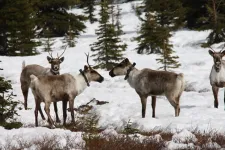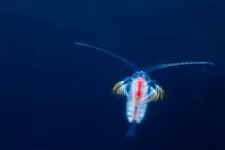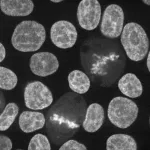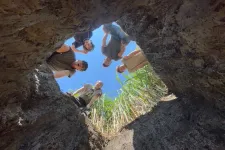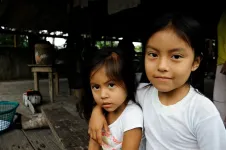Climbing caribou numbers in northeastern British Columbia prove that collaborations between Indigenous and colonial governments can reverse decades-long declines, but focus needs to shift to culturally meaningful recovery targets, a consortium of researchers and community members say in a new paper published this week in Science.
UBC Okanagan’s Dr. Clayton Lamb and West Moberly First Nation Chief Roland Willson co-lead the paper, Braiding Indigenous Rights and Endangered Species Law, alongside nine others for the influential journal.
“Abundance matters. There are many cases where endangered species laws have prevented extinction, but the warning signs of decline can appear long before the laws take effect. People who live and work on the land see these changes – we need to listen and act with them to prevent declines,” says Lamb, a biologist and MITACS postdoc in UBCO’s Irving K. Barber Faculty of Science. “There is a large gap between what the laws see as species recovery and what communities need for health, food security, and cultural well-being.”
The policy paper builds on collaborations between UBCO’s Lamb and Dr. Adam Ford, who have previously published research highlighting recovery efforts of the Klinse-Za caribou herd near the West Moberly and Saulteau First Nations. They also looked at evolving bison and salmon recovery efforts in North America.
Researchers heard stories from West Moberly Elders about a “sea of caribou” once looking like “bugs on the landscape,” but only 38 animals remained in 2013. Those numbers climbed to 115 a decade later thanks to interventions led by Indigenous groups. While these early signs of recovery are cause for immense celebration, the herd remains much smaller than historic levels.
“We need to move past a life support mentality for biodiversity,” says Ford, head of UBCO’s Wildlife Restoration Ecology Lab. “We must restore nature and the time-honoured ways people interact with the land.”
Canada and the United States have endangered species laws that are designed to recover species abundance to levels that will minimize the chance of extinction, but these recovery targets do not take into account culturally meaningful abundance or distributions of plants and animals, the authors say.
The paper highlights the current caribou count would only provide about three animals, or one meal per person, per year for Saulteau and West Moberly First Nations. The culturally significant count would require a herd of over 3,000 animals, an abundance more reflective of the historic “sea of caribou” level.
Naomi Owens-Beek, manager of Treaty Rights and Environmental Protection for Saulteau First Nation, contributed to the research and the policy paper.
She says the collaboration between Canadian and Indigenous leaders is essential to preserving traditional ways of life. Some Elders in the region have never tasted caribou, yet it was a staple of their ancestors and provided vital nutrition, material, spirituality, and a sense of place.
“We looked out at the land and thought, 'What do these caribou need to be once again the great herds our Elders spoke about?' We first reduced predation to make sure the caribou weren’t lost. Now we’re focusing on protecting and restoring habitat,” she says.
“Caribou habitat has long been mistreated, and now there’s so few caribou. These herds need space to thrive, and that’s why we’re working with the nations, the province of British Columbia and Canada, to heal these lands and increase the population so we can one day go back into the mountains and hunt caribou.”
The paper also examined efforts to restore salmon and bison habitat in North America. Chief Willson says each species shows modest signs of recovery, but that isn’t nearly the progress needed.
"Braiding Indigenous rights with laws protecting endangered species can enable nations to respect and safeguard the rights of Indigenous communities, curb the threat of species loss, and ultimately confer broad societal advantages," he says.
Lamb, Willson, Ford and Owens-Beek were joined by Allyson Menzies (School of Environmental Sciences, University of Guelph), Michael Price (Earth to Ocean Research Group, Department of Biological Sciences, Simon Fraser University), Scott McNay (Wildlife Infometrics), Sarah Otto (Department of Zoology & Biodiversity Research Centre at UBC), Mateen Hessami (Wildlife Science Center—Biodiversity Pathways at UBCO), Jesse Popp (School of Environmental Sciences, University of Guelph) and Mark Hebblewhite (Wildlife Biology Program, University of Montana).
Permalink: https://news.ok.ubc.ca/2023/05/18/call-for-canada-to-braid-indigenous-rights-with-endangered-species-law/
END
Call for Canada, US to braid Indigenous rights, endangered species laws
Indigenous leaders, UBCO researchers say current recovery targets do not support culturally vital harvest
2023-05-18
(Press-News.org)
ELSE PRESS RELEASES FROM THIS DATE:
Rising rates of induced labor need to be reconsidered in the context of the UK maternity services staffing crisis, study suggests
2023-05-18
A new study suggests that increasing rates of induction of labour (IOL) of pregnant women and people in the UK, without considering the accompanying, real-world impact on staffing workloads and patient care, may have unintended consequences.
The study from City, University of London, the University of Edinburgh and others highlights the limited evidence around the delivery of home-based IOL services, which were seen as an important step to reducing maternity staff workload.
It finds large gaps in knowledge on how to deliver home-based ...
Disentanglement——breaking the activity-selectivity “tradeoff” effect in catalytic conversion
2023-05-18
Researchers have reported a strategy to disentangle the activity-selectivity tradeoff for direct conversion of syngas, a mixture of carbon monoxide and hydrogen, into desirable ethylene, propylene, and butylene. These hydrocarbons are known as light olefins and are the most-used building blocks for plastics.
“Activity and selectivity are two primary indexes of a successful catalyst for chemical reactions. A higher activity means higher efficiency in converting feedstock to products, thereby reducing energy consumption,” said JIAO Feng, an associate professor at the ...
Perfection: The Enemy of Evolution
2023-05-18
DURHAM, N.C. -- Scientists are often trained to seek out the absolute best solution to a given problem. On a chalk board, this might look something like drawing a graph to find a function’s minimum or maximum point. When designing a turbojet engine, it might mean tweaking the rotor blades’ angles a tiny degree to achieve a tenth of a percent increase in efficiency.
Adrian Bejan, the J.A. Jones Distinguished Professor of Mechanical Engineering at Duke University, was busy demonstrating the former for a class full of students ...
From Seattle to space: Science that began at the Allen Institute blasts off to International Space Station
2023-05-18
SEATTLE — May 18, 2023 — This Sunday (May 21) at 2:37 p.m. PDT1, astronauts from Axiom Space in partnership with Cedars-Sinai will blast off to the International Space Station carrying cells from the Allen Institute for Cell Science, a division of the Allen Institute. There, Axiom Space astronauts will perform experiments and send real-time data back to researchers at Cedars-Sinai as part of their study on the effects of microgravity on human cells.
The experiments are part of the Ax-2 mission, funded by NASA and ...
Award to lay new ground for information extraction without relying on humans
2023-05-18
Considering the millions of research papers and reports from open domains such as biomedicine, agriculture, and manufacturing, it is humanly impossible to keep up with all the findings.
Constantly emerging world events present a similar challenge because they are difficult to track and even harder to analyze without looking into thousands of articles.
To address the problem of relying on human effort in situations such as these, Lifu Huang, an assistant professor in the Department of Computer Science and core faculty at the Sanghani Center for Artificial Intelligence and Data Analytics, is researching how machine learning can extract information without ...
Children’s Hospital Colorado Electron Microscopy Lab receives prestigious accreditation as Diagnostic Center for Primary Ciliary Dyskinesia (PCD)
2023-05-18
Aurora, Colo. (May 18, 2023) – Children’s Hospital Colorado (Children’s Colorado) announces its official Electron Microscopy (EM) accreditation and becomes one of only two sites in the nation certified in the use of electron microscopy to diagnose primary ciliary dyskinesia (PCD). This EM accreditation is granted by the PCD Foundation (PCDF), a patient-focused organization dedicated to providing resources for those with PCD, a rare and debilitating lung disease.
"Children’s Colorado’s Electron Microscopy Lab has a long history of providing specialized electron microscopic imaging for many disease ...
WVU researcher searching for ‘holy grail’ of sustainable bioenergy
2023-05-18
Searches for sustainable bioenergy and climate change solutions may be one in the same, according to a West Virginia University researcher.
Edward Brzostek, associate professor of biology, and his students at the WVU Eberly College of Arts and Sciences are creating mathematical models to predict how bioenergy crops will enhance and store soil carbon through a renewed five-year grant from the U.S. Department of Energy.
Brzostek said he believes the models could present a “win-win” that not only improves soil carbon but spurs renewable bioenergy from biological sources. This includes biofuels like corn ethanol and perennial grasses.
Soil ...
Conservationists propose “global conservation basic income” to safeguard biodiversity
2023-05-18
Publishing in the journal Nature Sustainability, a team of conservationists led by the Wildlife Conservation Society say that providing a “Conservation Basic Income” (CBI) – of $5.50 per day to all residents of protected areas in low- and middle-income countries would cost less than annual subsidies given to fossil fuels and other environmentally harmful industries.
CBI is an unconditional cash payment to individuals, similar to universal basic income (UBI)10 but targeting residents of important conservation areas. A Conversation Basic Income would support stewardship of ...
Study reveals key molecular interaction that sets the timing of our biological clocks
2023-05-18
Molecular clocks in our cells synchronize our bodies with the cycle of night and day, cue us for sleep and waking, and drive daily cycles in virtually every aspect of our physiology. Scientists studying the molecular mechanisms of our biological clocks have now identified a key event that controls the timing of the clock.
The new findings, published May 18 in Molecular Cell, reveal important details of the molecular interactions that are disrupted in people with an inherited sleep disorder called Familial Advanced Sleep Phase ...
Paleontology: Fossil fragments shed light on a new spinosaurid dinosaur in Spain
2023-05-18
A dinosaur specimen from Castellón, Spain represents a new proposed species of spinosaurid, reports a paper published in Scientific Reports. The identification of a potential new species suggests that the Iberian peninsula may have been a diverse area for medium-to-large bodied spinosaurid dinosaurs and sheds light on the origin and evolution of spinosaurids.
Spinosaurids comprise of different groups of dinosaurs that are often large, stand on two feet, and are carnivorous. Well-known examples of spinosaurids include Spinosaurus ...
LAST 30 PRESS RELEASES:
Scientists show how to predict world’s deadly scorpion hotspots
ASU researchers to lead AAAS panel on water insecurity in the United States
ASU professor Anne Stone to present at AAAS Conference in Phoenix on ancient origins of modern disease
Proposals for exploring viruses and skin as the next experimental quantum frontiers share US$30,000 science award
ASU researchers showcase scalable tech solutions for older adults living alone with cognitive decline at AAAS 2026
Scientists identify smooth regional trends in fruit fly survival strategies
Antipathy toward snakes? Your parents likely talked you into that at an early age
Sylvester Cancer Tip Sheet for Feb. 2026
Online exposure to medical misinformation concentrated among older adults
Telehealth improves access to genetic services for adult survivors of childhood cancers
Outdated mortality benchmarks risk missing early signs of famine and delay recognizing mass starvation
Newly discovered bacterium converts carbon dioxide into chemicals using electricity
Flipping and reversing mini-proteins could improve disease treatment
Scientists reveal major hidden source of atmospheric nitrogen pollution in fragile lake basin
Biochar emerges as a powerful tool for soil carbon neutrality and climate mitigation
Tiny cell messengers show big promise for safer protein and gene delivery
AMS releases statement regarding the decision to rescind EPA’s 2009 Endangerment Finding
Parents’ alcohol and drug use influences their children’s consumption, research shows
Modular assembly of chiral nitrogen-bridged rings achieved by palladium-catalyzed diastereoselective and enantioselective cascade cyclization reactions
Promoting civic engagement
AMS Science Preview: Hurricane slowdown, school snow days
Deforestation in the Amazon raises the surface temperature by 3 °C during the dry season
Model more accurately maps the impact of frost on corn crops
How did humans develop sharp vision? Lab-grown retinas show likely answer
Sour grapes? Taste, experience of sour foods depends on individual consumer
At AAAS, professor Krystal Tsosie argues the future of science must be Indigenous-led
From the lab to the living room: Decoding Parkinson’s patients movements in the real world
Research advances in porous materials, as highlighted in the 2025 Nobel Prize in Chemistry
Sally C. Morton, executive vice president of ASU Knowledge Enterprise, presents a bold and practical framework for moving research from discovery to real-world impact
Biochemical parameters in patients with diabetic nephropathy versus individuals with diabetes alone, non-diabetic nephropathy, and healthy controls
[Press-News.org] Call for Canada, US to braid Indigenous rights, endangered species lawsIndigenous leaders, UBCO researchers say current recovery targets do not support culturally vital harvest
